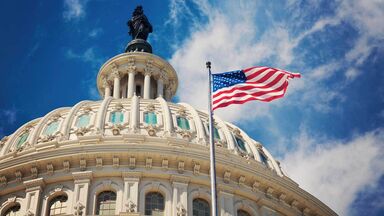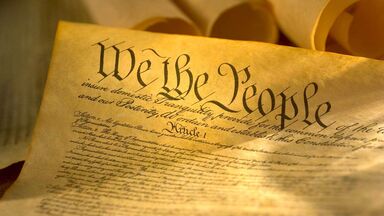what specific powers does the u.s. constitution give to a national police force?
Powers of the National Authorities: A Elementary Breakdown
The national government, also known equally the federal government, has the right to practise certain powers. These powers include those named in the United states Constitution besides equally unsaid and inherent powers of authorities. Keep reading for examples of the powers of the national government that go on the state performance.
 powers of the national government represented by Us Capitol
powers of the national government represented by Us Capitol
Enumerated Powers of the National Authorities
Enumerated powers, besides called delegated powers, are expressly named in Article I, Department 8 of the U.Southward. Constitution. These are powers held only by the national authorities (federal powers) and not united states of america. There are 27 specific enumerated powers in total, which autumn into the following categories.
Lay and Collect Taxes
The national authorities has the power to prepare, collect and spend federal taxes. The commodity also gives the national government the ability to collect "duties, imports, and excises." Similar to the national government, state governments have the power to levy state taxes.
Regulate Commerce
The ability to regulate commerce gives the national government the ability to create financial relationships. These relationships can be with "foreign nations, amidst the several States, and with the Native American Tribes." The national regime tin can too borrow money on the country'due south credit.
Institute a Uniform Rule of Naturalization
Naturalization is the act of admitting a foreign person to a country's citizenship. Information technology makes the foreign person a new citizen. The national authorities lone can create a rule regarding the naturalization of new citizens.
Create Bankruptcy Laws
The national government has the power to establish and regulate laws concerning financial defalcation. The clause was interpreted in 1898 every bit the Bankruptcy Act, which allowed individuals to declare bankruptcy voluntarily, no matter their financial status or occupation.
Money Money
Creating and regulating currency is some other ability of the national authorities. It as well has the right to fix standards of weights and measures and levy penalisation for counterfeiting American currency.
Constitute Post Offices
If you've ever wondered who decided to put in a new postal service part, information technology was the federal government. Article I gives the government the ability to construct post offices and post roads. Information technology likewise has the power to regulate the mail.
Promote the Progress of Science and Arts
Information technology doesn't audio like a ability, but this section of Article I is known as the Copyright Clause. Information technology gives the national government the power to issue copyrights to authors and scientists that give them the "sectional Correct to their respective Writings and Discoveries."
Found Federal Courts
The U.S. Constitution called for the creation of the Supreme Courtroom, but that was the only federal court explicitly established in its text. Instead, it gives the national government the power to establish lower federal courts ("tribunals inferior to the Supreme Court") that feed into the Supreme Court.
Define and Punish Piracy
The enumerated power explicitly gives the national government the power to "define and punish Piracies and Felonies committed on the high Seas, and Offences confronting the Law of Nations." The clause was initially meant for actual pirates who stole from ships at ocean, simply it states that the national government too has the ability to define (or redefine) the meaning of "piracy."
Conduct Foreign Affairs
Relationships between foreign countries are also under the purview of the national government. According to Article I, the national regime tin can "declare War, grant Letters of Marque and Reprisal, and brand Rules concerning Captures on Land Water." States do not have the power to comport these relationships with foreign nations in the fashion that the federal government can.
Raise and Maintain Armed Forces
The Constitution gives the national government the ability to "heighten and support Armies" every bit well equally "provide and maintain a Navy." It stipulates that the cribbing of money for an army should be no longer than 2 years. The national authorities can likewise brand rules to govern and regulate these military forces.
Telephone call Along and Organize Militias
Although a militia is a forcefulness raised by the civil population, the national government has the power to call forth such a group "to execute the Laws of the Spousal relationship, suppress Insurrections and repel Invasions." It can also organize, arm, discipline, and govern these militias.
Ability Over the Seat of Government
Washington, D.C. is the capital letter of the United States, and the national government has the power to "exercise exclusive Legislation in all Cases any" in the District of Columbia. It has authority over the territory and can regulate the erection of federal buildings such equally forts, arsenals and dockyards.
Implied and Inherent Powers of the National Government
Non all powers of the national regime are expressly named in the Constitution. The terminal clause of Article I, Section 8 is Clause xviii, which is often known as the "necessary and proper" clause. Information technology gives Congress the power to make laws that enforce the powers of the federal government. The clause makes the power of the national government more rubberband and wide-reaching.
Throughout American history, Congress and the courtroom arrangement has used the "necessary clause to define the i mplied powers and inherent powers of the government" — that is, powers that are non stated in the Constitution, only that tin can be inferred from its text.
Implied Powers
Unsaid powers of the national government are set past precedent in legislation or in courtroom. They are accounted necessary for the government to operate by the "necessary and proper" clause based on the enumerated powers in the Constitution. Examples of the implied powers of the national government include:
- creation of the Kickoff Bank of the United States (nether the ability to regulate commerce)
- creation of the Internal Acquirement Service (under the power to collect taxes)
- implementation of the military draft (under the power to raise armies)
- prosecuting media piracy (under the ability to punish piracy)

Inherent Powers
Some powers belong to a government simply because the government exists. These powers are shared by all governments, not just the Us. They include:
- exploring and acquiring territory
- controlling national borders and clearing
- defense against revolution
Throughout history, the three branches of the federal government (executive, judicial and legislative) have interpreted these powers every bit they relate to a changing future. Those who wish to limit the powers of the national authorities are chosen strict constructionists — they believe that the regime can merely practise enumerated powers, and nothing more. Loose constructionists allow for more interpretation of the enumerated powers.
Source: https://examples.yourdictionary.com/powers-national-government-simple-breakdown
0 Response to "what specific powers does the u.s. constitution give to a national police force?"
Postar um comentário